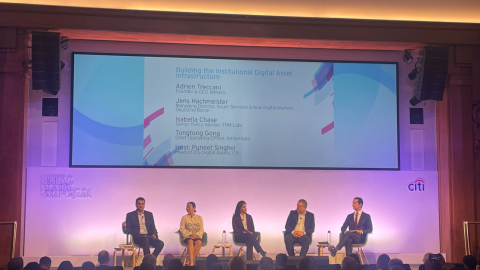Citi’s Digital Money Symposium convened a diverse group of industry leaders to discuss emerging trends and the future of digital currency.
### The Value of Blockchain
During the panel entitled “Money, Tokens, and Games: Blockchain’s Next Billion Users and Trillions in Value,” Dr. Ruth Wandhofer, partner at Gauss Ventures, emphasized the need for advancements in digital identity, advocating for users to regain control over their data instead of relying on algorithms for their online experiences.
Ronit Ghose, Citi Global Insights’ global head of future finance and digital, articulated the concept of “disruptive technology.” He asserted that true disruption often originates from smaller players rather than established giants, citing AliPay’s innovative solution to existing payment system challenges.
Aaron Powers, co-founder and CEO of Hunit, added that the emergence of smart contracts significantly enhances digital identity.
Becks Perfect, founder of Nifty World NFT, highlighted that the rise of individualized digital identities empowers customers and creators, substantially transforming the creator economy and reducing the influence of social media platforms. She noted that while gaming, particularly in East Asia, benefits from Web 3.0 technologies, its growth will be gradual.
### Evaluating Digital Asset Frameworks
The next session, “Building the Institutional Digital Asset Infrastructure,” featured a panel of experts discussing advancements in digital asset frameworks. Jens Hachmeister from Deutsche Börse argued that the digital securities sector should prioritize market efficiency over a purely technological focus.
Adrien Treccani, CEO of Metaco, reminded attendees of the foundational principles of blockchain, stressing that it was created for decentralization. He warned that the over-reliance on banks could lead to imbalances in wealth concentration.
Tongtong Gong, COO of Amberdata, expressed the challenges financial institutions face in constructing digital asset infrastructures, primarily due to insufficient understanding of decentralization and market risks.
Isabella Chase, a senior policy adviser at TRM Labs, discussed the importance of interoperability among transaction chains amidst rising financial crime concerns, urging the development of specific tools to address these challenges.
Hachmeister highlighted the significance of data integrity in integrating legacy systems with decentralized identities and emphasized that crafting a coherent solution is essential for future asset generation.
Treccani noted that while decentralized technology evolves slowly, achieving efficiency will foster a diverse community of retail and institutional users. He raised key questions about compliance, trading, and settlement processes as institutions adapt to the technology.
### Regulatory Landscape for Digital Assets
In the “Regulating Digital Assets” session, panelists examined the ongoing developments surrounding digital asset regulation. Nicole Sandler from Barclays noted the varied classifications of digital assets by regulatory bodies, indicating that calling them ‘currencies’ is often misleading due to their price volatility.
Discussing crypto policy in the UK, Monica Sah from Clifford Chance emphasized the limited regulatory framework, primarily focused on anti-money laundering measures and consumer protection.
Ijeoma Okoli, director of the Digital Economy Initiative, provided insight into the U.S. landscape, highlighting the potential for regulatory action under the Biden Administration, despite ongoing challenges in the crypto sector.
Sandler noted the rapid proliferation of digital assets, which has surged from 300 to over 20,000 in a short span, underscoring the need for a cohesive global taxonomy in regulation.
Professor Lawrence Deju-Wiseman from PwC Forensic Services suggested that while global consensus on cryptocurrency may be elusive, a unified framework is essential for effective regulation.
